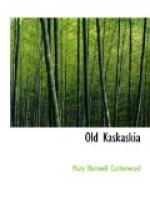It had rained steadily since the political field day which had drawn such crowds to Kaskaskia. The waters of the Okaw had risen, and Father Baby’s way to his work had been across fields of puddles, through which he waded before dawn; knowing well that a week’s growth of weeds was waiting for him in its rankness.
The rain was not over. It barely yet restrained itself, and threatened without falling; blotting out distance as the light grew. A damp air blew from the northwest. Father Baby found the little avenues between his rows of maize and pea vines choked with the liberal growth which no man plants, and he fell furiously to work. His greatest pleasure was the order and thrift of his little farm, and until these were restored he could not even wallow comfortably. When he had hoed and pulled out stubborn roots until his back ached, he stood erect, letting his hands hang outspread, magnified by their mask of dirt, and rested himself, thinking of the winter dinners he would enjoy when this moist land should take on a silver coating of frost, and a frozen sward resist the tread of his wooden shoe.
“O Lord,” said Father Baby, “I confess I am a sinner; we all are. But I am a provident sinner who makes good use of the increase Thou dost send through the earth. I do Thee to wit that Antoine Lamarche’s crop is pretty weedy. The lazy dog will have to buy of me, and if I do not skin him well—But hold on. My blessed Master, I had forgot that Antoine has a sick child in his house. I will set his garden in order for him. Perhaps Thou wilt count it to me for righteousness, and let it offset some of my iniquities.”
So when he had finished his own, the friar put his hoe into his neighbor’s patch, and worked until the sweat rolled down his thin cheeks. Gusts of rain added their moisture. As much light as the world was to have that day filtered through sheets of vapor. The bluffs bordering the Okaw could not be seen except as a vague bank of forest; and as for the lowlands across the great river, they might as well have had no existence.
It grew upon Father Baby’s observation that the Mississippi had never looked so threatening. He stuck to his hoeing until he was nearly exhausted, and Antoine Lamarche’s ground showed at least enough improvement to offset all the cheating he had done that week, and then made his way among bushes to the verge of the bank. The strong current always bearing down from the northwest against the peninsula had increased its velocity to a dizzy sweep. It bit out pieces of the shore as large as Father Baby’s shop, and far and near these were seen falling in with splashes like the spouting of whales.
“At this rate,” said Father Baby aloud, “I shall have no part left in the common fields by next year.”




